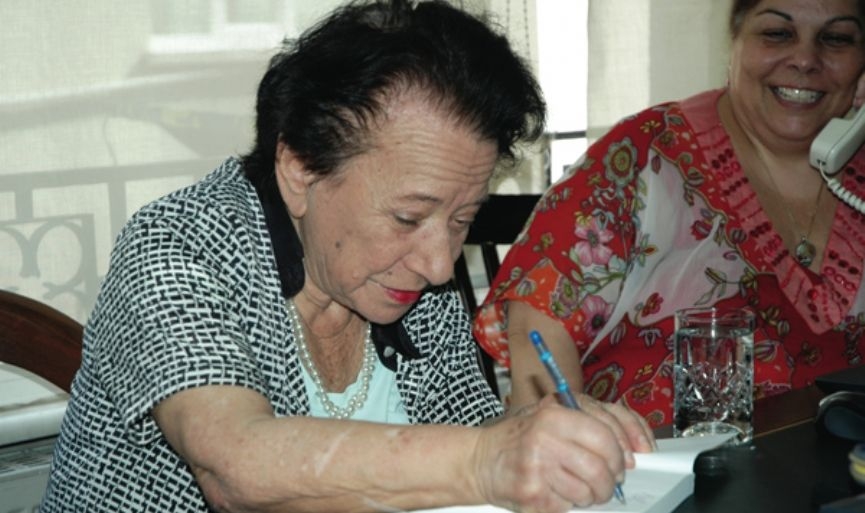
Irreplaceable Klara
Klara Perahya, editor of Saloms Judeo- Espanyol page, had passed away on September 14, 2017, at the age of 97. Klara Perahya had spent most of her life doing charity work and taking part in social events. She left behind a void that will be impossible to fill.
Having spent most of her years trying to improve Judeo-Espanyol language and culture, Klara Perahya wrote weekly articles for Salom, in Judeo Espanyol language. Her literary works in Judeo- Espanyol have been published over the years.
Her contributions in publishing the unprecedent Judeo-Espanyol-Turkish dictionary were significant. She talked about the dictionary in an interview she gave, in 2009:
“About fifteen years ago, I was back from a trip to USA and Ruti Meranda was back from a trip to Europe. We had talked about ‘Proverboz i Diças’, before. When Ruti told me that in France there is great interest in this language, I told her that I had observed the same thing, in USA. We decided to write and publish a dictionary, together. However, neither of us had the academic background or the philological knowledge. We decided to create a friend group and discuss the Turkish meaning of the words our elders used. At the beginning, we were a large group, but later Ruti Meranda, Suzi Danon, Rejin Sadaka and Çela Zakuto and I created a smaller group and we worked more intensely. We determined which words would be in the dictionary and their meaning in Turkish. They told us that Turkish-Judeo Espanyol section of the dictionary would be very easy, since we were in the age of computers, but it was not easy, at all. Because, sometimes the Turkish meaning of one word in Judeo-Espanyol is a whole sentence. In the end, we decided that with his knowledge and experience in computers, Metin Delevi could help us translate.”
Besides the dictionary, Klara Perahya also published the book, “Erensya Sefaradi” where she compiled idioms and proverbs in Judeo-Espanyol. She also published “Français-Judeo-Espanyol” dictionary in 1998, with her husband Eli Perahya.
“Those who can write, should write; those who can speak even a little, should speak”
Klara believed that keeping Judeo-Espanyol language alive was very important. She talked about it in the same interview:
“Our ancestors, especially our grandmothers did not know how to read or write until mid-19th century. Only the upper-class families’ children went to Europe to study and learn how to read and write. They also learned different languages. Until the end of the 19th century, middle-class women used to take care of housework and raise their children. Since men used to go to synagogues, they learned to read Hebrew. Our women, despite not knowing how to read and write, knew exactly how to express their feelings. They had a philosophical understanding. Their vocabulary was very limited, but they managed to express themselves even with the limited number of words they knew. I always believed that this was an indication of culture and I did not want it to fade away…
Therefore, I have a favor to ask. Those who can write in Judeo-Espanyol, should write; those who can speak Judeo-Espanyol even a little, should speak. Even if they can’t teach their children, they should talk to their spouse and elders, in Judeo Espanyol. Only then, this language can be passed down from one generation to the next.”
Klara, alone and with her husband was invited to numerous conferences and symposiums about Judeo Espanyol as a guest speaker. With her encouragement and support, many people wrote books, articles in Judeo Espanyol.
On Sunday, September 17, Klara Perahya was buried at Acibadem Jewish Cemetery following a ceremony at Neve Salom where her family and loved ones attended.
Related Newsss ss












